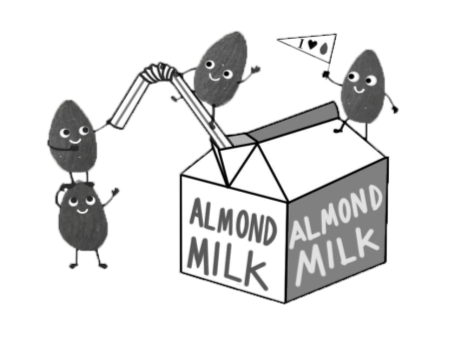New trend of almond milk causes Staples to go nuts

Got milk?
In many childhoods, this phrase popped up endlessly on cheesy television commercials and the back of every milk carton parked next to a brimming bowl of cereal. But now the question has changed, as more and more students have started to ask, “Got almond milk?”
Almond milk is exactly what it sounds like. It’s a beverage usually made almost exclusively of ground almonds and water, according to sites for almond milk brands like Silk. Puzzling as it is to picture, the simple combination results in a creamy white beverage that looks very similar to cow’s milk. Almond milk has been around for many years, but only recently has it become a popular health-kick item around the halls of Staples.
Mikayla DiDonato ’17 first learned about almond milk through several healthy-eating themed instagrams, such as @nourish_yourself and @funfreshandhealthy.
“I started drinking almond milk because I wanted to use less animal byproducts because I learned about the mistreatment of animals, such as cows, in factories where the milk is extracted,” Didonato said.
According to ASPCA, more than nine million dairy farm cows are given hormones and unnatural diets, and are raised in harmful conditions. Since her discoveries, Didonato has worked to incorporate the nutritious beverage into smoothies, oatmeal and healthy baked goods.
Almond milk is not only appealing because it’s dairy-free but also because it contains a wide range of important vitamins and minerals, and is low in calories and fat. Unflavored, unsweetened almond milk typically contains around 40 calories and three grams of fat, compared to about 120-140 calories and five grams of fat in cow’s milk, according to FitDay and Livestrong.
“Almond milk has a lot of benefits, such as being rich in vitamin E and calcium. It also normally doesn’t contain a ton of unnatural ingredients that are foreign to your body like many other milks do,” Didonato said.
The reasons for abandoning the classic Oreo companion for this nutty novelty are endless. Aside from nutritional inclinations, lactose intolerance, which currently affects about 25 percent of Americans, is a major incentive.
“I feel better after drinking [almond milk] than if I were to drink regular milk, just because the dairy hurts my stomach,” Olivia Rubin ’17 said.
As students have demanded this non-dairy delight, retail has answered. Two of the most common coffee destinations in Westport—Starbucks and Dunkin Donuts—have recently started offering almond milk as an alternative coffee additive. Dunkin Donuts announced the arrival of this new product in select locations nationwide on their website Sept. 3.
Students like Nikhita Shankar ’15 have welcomed this change.
“I like almond milk with my coffee because there’s a higher nutritional value, and it makes my coffee sweeter without adding sugar,” Shankar said.
Rubin, however, isn’t sold on the coffee option.
“I tried [almond milk] in coffee [and] tea, but it definitely has a different, thinner texture that I don’t think works as well,” she said.
Incorporating almond milk into one’s diet definitely requires some experimentation, and above all investigation. Didonato stresses that amidst the new hype, it is still important to be knowledgeable about the beverage’s ingredients.
“People should know that not all almond milk is healthy because there still are many types that contain unhealthy ingredients and sugars,” Didonato said.
“It’s important to focus on reading ingredients and only buying the brands that contain very little of them that you can recognize.”

Ale Benjamin ’15 started out like everyone else in the Introduction to Journalism class her sophomore year. However, the class wasn’t just a way to...


























































